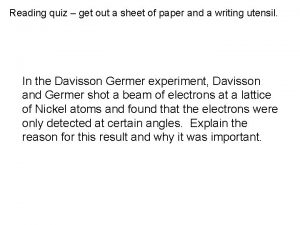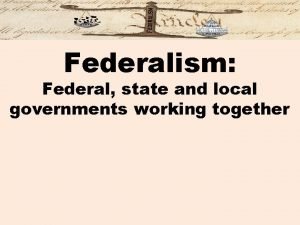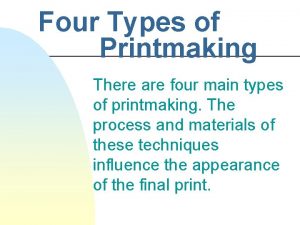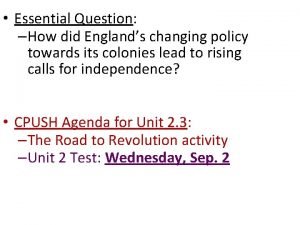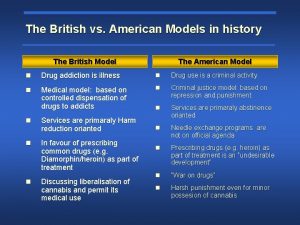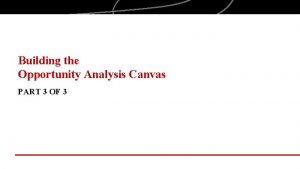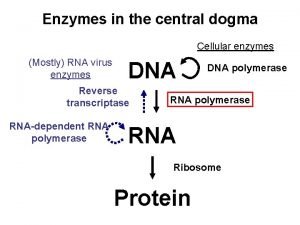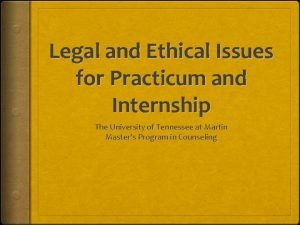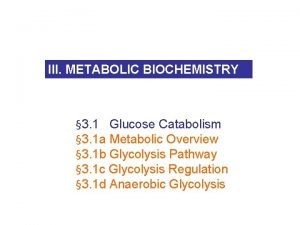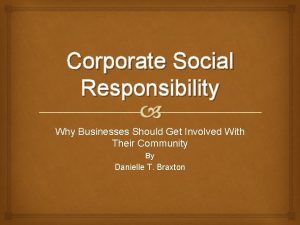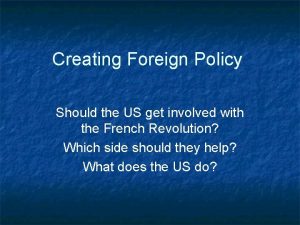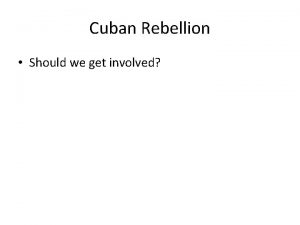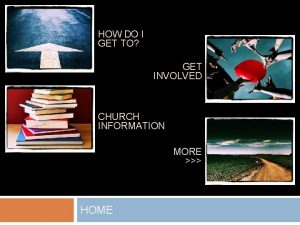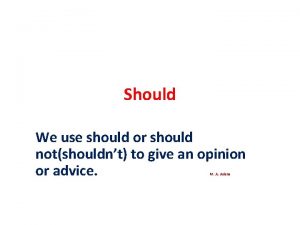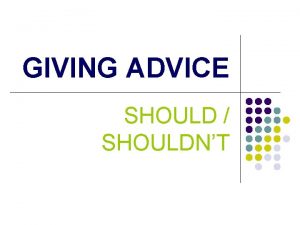When should the government get involved in the

































- Slides: 33

When should the government get involved in the economy? Worker Safety Laws Barber Shop Licenses Bank Bailouts Every society needs to decide how much government involvement is desirable

Review: The Invisible Hand of the free market: If society wants computers and people are willing to pay high prices then… • Businesses have the INCENTIVE to start making computers to earn PROFIT. • This leads to more COMPETITION…. • Which means lower prices, better quality, and more product variety. • To maintain profits, firms find most efficient way to produce goods and services. The government doesn’t need to get involved since the needs of society are automatically met.

Does the Free Market ever FAIL to meet society’s needs?

What is a Market Failure? • Market Failure- A situation in which the free-market system fails to satisfy society’s wants. (When the invisible hand doesn’t work. ) • Private markets do not efficiently bring about the allocation of resources. What’s the result… The government might be called upon to attempt to satisfy society’s wants.

How does the free market FAIL?

The Four Market Failures We will focus on four different market failures: 1. 2. 3. 4. Public Goods Externalities (third person side effects) Monopolies Unequal distribution of income In each of the above situations, the government may step in to attempt to allocate resources efficiently.

7


Market Failure #1: Public Goods

Public Goods If there was no government, how would schools, parks, and freeways be different? Would there be enough to meet our needs? Public Sector- The part of the economy that is primarily controlled by the government Private Sector- The part of the economy that is run by private individuals and companies that seek profit. Video: Fire Department Auction 10

Public Goods Why must the government provide public goods and services? • It is impractical for the free-market to provide these goods because there is little opportunity to earn profit. • This is due to the Free-Rider Problem Free Riders are individuals that benefit without paying.

What’s wrong with this picture?

The Free Rider Problem Examples: 1. People who download music illegally 2. People who watch a street performer and don’t pay 3. Teenagers that live at home and don’t have a job

Does anyone free ride off you? Canadian Military Spending: $21. 8 Billion US Military Spending: $660 Billion Why doesn’t Canada spend more on their military?

What’s wrong with Free Riders? • Free-Riders keep firms from making profits. • If left to the free market, essential services would be under produced. To solve the problem, the government can: 1. Find new ways to punish free-riders. 2. Use tax dollars to provide the service to everyone.

Think About It: Why is Domino’s providing this public good?


Definition of Public Goods

Definition of Public Goods Public goods have two criteria: 1. Non-exclusionary • Cannot exclude people from enjoying the benefits (even if they don’t pay). • Ex: National Defense 2. Shared Consumption (Non-rival) • One person’s consumption of a good does not reduce the usefulness to others. • Ex: City Park

Identify which of the following are TRUE public goods (are non-exclusionary and non-rival in consumption): 1. Hamburgers 2. Satellite TV 3. Free Public Education 4. Homes 5. Street lights 6. Highways

2008 Audit Exam 76%

2005 Exam

Review 1. List the characteristics of the Free Market. 2. Define Market Failure. 3. What is the “invisible hand”? 4. List the 4 Market Failures. 5. Why must the government provide public goods? 6. Define Free Rider. 7. What is wrong with having free riders?

Market Failure #1 PUBLIC GOODS Why doesn’t the free market provide them? There is little opportunity to earn profit. Why NOT? Individuals benefit without paying.

How do we decide how many public goods we need? 25

Can the government… 1. Prevent wildfires in San Diego forever? 2. Ensure that no one ever speeds on the freeway? 3. Create a research station on Mars? 4. Stop pollution from fossil fuels? 5. Completely stop illegal immigration? 6. Make sure everyone in the US has a job? YES! But the costs outweigh the benefits. How does the government decide how many public goods to provide?

How does the government determine what quantity of public goods to produce? They use Supply and Demand for Public Goods. The Marginal Social Benefit of the good is its usefulness to society add is determined by citizens willingness to pay. Supply of Public Goods. The Marginal Social Cost of providing each additional quantity. Produce where MSB = MSC

Demand for a New Park Marginal willingness to pay higher taxes # of Parks Adam is Jill is Society’s Assume: Marginal willing to Demand Cost 1. There are only pay for Parks two people in 1 2 3 4 5 $4 $3 $2 $1 $0 $5 $4 $3 $2 $1 society. $5 $9 2. Each additional $7 $5 park costs $5 $5 $5 How many parks $3 $5 should be made? $1 $5

Demand for a New Park Marginal willingness to pay higher taxes # of Parks Adam is Jill is Society’s Marginal willing to Demand Cost per pay (MSB) Park 1 2 3 4 5 $4 $3 $2 $1 $0 $5 $4 $3 $2 $1 $9 $7 $5 $3 $1 $5 $5 $5

Demand for a New Park Marginal willingness to pay higher taxes # of Parks Adam is Jill is Society’s Marginal willing to Demand Social pay (MSB) Cost 1 2 3 4 5 $4 $3 $2 $1 $0 $5 $4 $3 $2 $1 $9 $7 $5 $3 $1 $5 $5 $5

Supply and Demand for Public Parks Price $ 9 The Demand is equal to the marginal benefit to society 7 5 3 D=MSB 1 0 1 2 3 4 Quantity of Parks 5

Supply and Demand for Public Parks Price $ 1. What if the government made 1 park? 2. What if the government made 4 parks? 9 7 MSB = MSC S=MSC 5 The supply is the public good’s marginal cost to society 3 1 0 1 2 D=MSB 3 4 Quantity of Parks 5

5 Ways Occupational Licensing Laws Hurt (Almost) Everyone Read the above article and consider the following: Evaluate the strength of the author’s argument. - In your opinion, are there some occupations for which licensing requirements make sense? - Should a surgeon be required to have a state-issued licence? Suppose there was no license requirement; do you think this would affect that quality of service provided by surgeons? - Why is it possible that the quality of service would be wholly unaffected by the lack of licensing requirements for surgeons?
 Get into get out of
Get into get out of Idioms in one thing by one direction
Idioms in one thing by one direction Why do juliet’s parents think she is sad?
Why do juliet’s parents think she is sad? Get focused get results
Get focused get results Get up get moving quiz
Get up get moving quiz Germer
Germer Get up get moving quiz
Get up get moving quiz Pseudocode selection
Pseudocode selection Get up get moving quiz
Get up get moving quiz National powers
National powers Best output design
Best output design Project storyboard template
Project storyboard template What continents were involved in the columbian exchange
What continents were involved in the columbian exchange Four categories of printmaking
Four categories of printmaking Pochampally sarees making process
Pochampally sarees making process Applications of flame photometry slideshare
Applications of flame photometry slideshare No taxation without representation
No taxation without representation What is people as media and people in media similarities
What is people as media and people in media similarities Fortune society scattered site housing
Fortune society scattered site housing A purposeful refusal to become generally involved
A purposeful refusal to become generally involved Retailing and wholesaling
Retailing and wholesaling Emergency admission process
Emergency admission process Simplex method
Simplex method British model involved with drugs
British model involved with drugs Champion of filipino students ilipino students
Champion of filipino students ilipino students Tibialis posterior
Tibialis posterior Opportunity analysis canvas
Opportunity analysis canvas Thinking language and intelligence
Thinking language and intelligence Mount st helens plates involved
Mount st helens plates involved Measuring the actual performance
Measuring the actual performance Dna central dogma
Dna central dogma Sigma bond example
Sigma bond example Professional and ethical issues during internship
Professional and ethical issues during internship Tunesflux
Tunesflux





